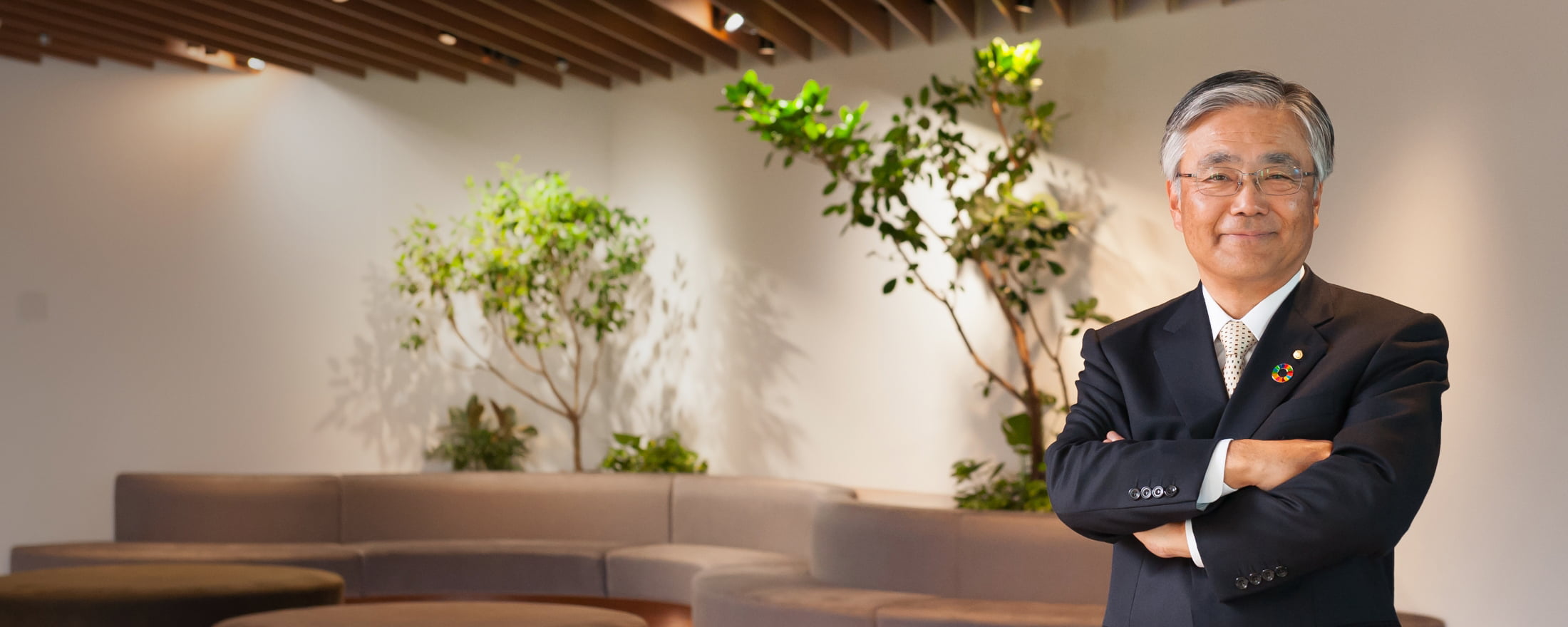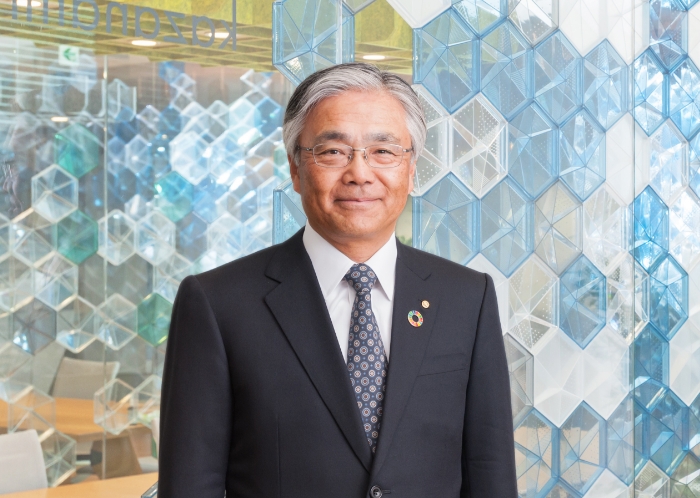Message from the President and CEO

Achieving a Higher Level of Balance
Between Solving Social Issues and
Growing as a Company
to Forge a Sustainable Future
Representative Director,
President and CEO,
Tokyo Tatemono Co., Ltd.


Achieving a Higher Level of Balance Between Solving Social Issues and Growing as a Company to Forge a Sustainable Future
Representative Director, President and CEO, Tokyo Tatemono Co., Ltd.

Tokyo Tatemono was founded in 1896 by Zenjiro Yasuda, the founder of the Yasuda Zaibatsu, with a mission to modernize real estate transactions and promote urban development. Since its founding, the company has upheld the principles championed by Yasuda: putting customers first and maintaining an enterprising spirit in anticipation of the changing times. These have served as the foundation of the company's operations. Through its real estate business, Tokyo Tatemono has continuously worked to solve social issues while pursuing growth as a company, allowing it to sustain operations for nearly 130 years. Our long-term vision expresses our determination to become a good company for all stakeholders by pursuing both the resolution of social issues and the growth as a company at a higher level as a Next-Generation Developer. That determination is the embodiment of Tokyo Tatemono Group's views and commitment toward sustainability.
On a personal level, I became acutely aware of the growing sense of urgency surrounding sustainability in society during the Great East Japan Earthquake on March 11, 2011. The devastating natural disaster caused tremendous damage, triggering a renewed scrutiny of efforts to build a sustainable society. At the time, I was temporarily assigned to Tokyo Tatemono Realty Investment Management, a group company of Tokyo Tatemono and the asset management company for the J-REIT *1 in which Tokyo Tatemono has invested. *2 Because J-REITs are composed of aggregated real estate assets, they have made efforts to meet the demands of capital markets and individual investors by ensuring transparency through proactive disclosure since the early days of the market. Information regarding the impact of the earthquake on portfolio properties was of great importance to both domestic and international investors. However, in an unprecedented emergency like the Great East Japan Earthquake, ensuring the suitability of disclosures became a major challenge. Immediately after the earthquake, although it was difficult to gather and disclose information, we worked closely with Tokyo Tatemono, which managed the properties, to collect as much information as possible. Prioritizing speed, we disclosed information on the extent of physical damage in both Japanese and English in the early morning hours, around 2 or 3 a.m., on the day following the disaster. This disclosure was later highly praised by investors and others. It reaffirmed the importance of not only responding appropriately to changes in the social environment and emergencies but also of consistently disclosing information transparently. Since its founding, Tokyo Tatemono has pursued the creation of social value through our real estate business by modernizing real estate transactions and promoting urban development. I believe that our longevity, spanning nearly 130 years, is a result of remaining true to this mission. We remain committed to carrying this mission forward into the future.
-
*1Japan Prime Realty Investment Corporation.
-
*2Temporarily assigned from 2009 to 2015.At the time, the company's name was Tokyo Realty Investment Management.
The Relationship Between Our 2030 Long-Term Vision and Sustainability
In 2020, Tokyo Tatemono Group announced its long-term vision, Becoming a Next-Generation Developer, setting a target around the year 2030. The group's aim is to be a good company for stakeholders by leveraging our businesses to solve social issues and achieve higher levels of growth as a company. To clarify the target timeframe, we have recently revised "around 2030" to "2030."
To achieve our long-term vision, in 2021 we identified 14 key material issues to address that represent the shared value we aim to create with society through our business. From a sustainability perspective, we particularly focus on material issues such as "contributing to a safe and secure society" and "addressing the diverse needs of customers and society." These material issues are categorized under social value creation, which includes "creating value of place and value of experience" and "coexistence with the Earth and the environment."
To reach our goals by the target year of 2030, we have positioned our medium-term business plans as milestones: the previous 2020-2024 plan as the "hop" stage and the current 2025-2027 plan as the "step" stage. The previous plan emphasized the advancement of ESG management, and our ongoing inclusion in ESG indexes and strong evaluations from ESG rating agencies, which are among the benchmarks, have led us to believe that our progress in this area has been positively recognized. While advancing ESG management remains one of our goals, achieving a higher level of balance between the resolution of social issues and the growth as a company, as called for in our long-term vision, is also of critical importance. To fulfill that objective, our current medium-term plan focuses on evolution of our management infrastructure as the basis for achieving it. In the current medium-term plan, we have once again placed sustainability, which encompasses the environment, society, and governance, alongside human capital and digital transformation (DX), as a key foundation for enhancing our management infrastructure. By clearly defining sustainability as an essential part of our management infrastructure during this "step" (growth) stage, we aim to accelerate and strengthen our collective efforts to achieve the long-term vision.
Because real estate development often requires long timeframes before tangible results appear, the three years covered by the current medium-term plan will be especially important for achieving the 2030 targets laid out in the long-term vision. The same applies to our environmental targets for 2030. It is important that we monitor progress during the current medium-term period through 2027 as a milestone and leverage those results in the final phase beginning in 2028.

Building Cross-Sector Partnerships to Make the City of Tokyo a Global Sustainability Leader
Since its founding in 1896, Tokyo Tatemono has maintained a strong presence in its core focus areas of Yaesu, Nihonbashi, and Kyobashi (YNK). Currently, we are promoting the large-scale Yaesu redevelopment project, named TOFROM YAESU, which includes the site of our former headquarters along Yaesu-dori. With TOFROM YAESU as a starting point, we will continue working to revitalize the YNK area, enhance its value, and foster vibrancy through another major redevelopment project in the Yaesu area, the Gofukubashi Project, as well as other initiatives. The long-term added value that we contribute to the YNK area through these efforts can be seen as a core part of our purpose as a company.
However, increasing the future value of the YNK area is not something that we can achieve alone. It is essential that we collaborate with local landowners, companies based in the area, and the various public, private, and academic stakeholders active in the region.
For example, to improve the area's overall environmental performance, we plan to introduce high-efficiency cogeneration systems (CGS) in projects like TOFROM YAESU and the Gofukubashi Project. These will be combined with systems such as CGS direct waste heat recovery, CGS waste-heat chillers, and thermal storage tanks to build an efficient district heating and cooling (DHC) plant. We also plan to enable energy sharing with existing DHC plants to promote efficient energy use throughout the area. We are also considering smart initiatives that involve centralizing and utilizing environmental data such as temperature and humidity in buildings within the YNK area, along with human traffic data from workers and visitors, to optimize energy efficiency and reduce environmental impact. By working not only with private-sector data but also in partnership with government agencies to gather and utilize public infrastructure data, we believe we can optimize our smart development efforts to achieve even greater efficiency.
Additionally, not only are we planning a variety of initiatives to improve worker wellbeing at TOFROM YAESU, but we are also considering collaborations with other companies in the YNK area to transform the district into a more walkable neighborhood. Our vision is to create a lively district where people naturally enjoy walking and experience a sense of wellbeing simply by being there. We also hope to expand the reach of our partnerships beyond the YNK area to the diverse group of companies engaged in various initiatives in the Marunouchi area across from Tokyo Station. We believe that strengthening collaboration throughout the Tokyo Station area, which stands as the center of the nation, would be an ideal way to further enhance its overall value. It is our view that these efforts will increase Tokyo's overall appeal and strengthen its competitiveness as an international city.
Working Toward the Realization of Sustainable Development
The Sustainable Development Goals (SDGs) are widely recognized as international targets for creating a more sustainable and better world by 2030. In our long-term vision, we have committed to contributing to the SDGs as part of our efforts to solve various social issues. With an awareness of "coexistence with the Earth and the environment," which is a shared value with society that we realize through our business, we have identified "promotion of a decarbonized society" and "promotion of a recycling-oriented society" as material issues for realizing our long-term vision.
The term "sustainable development," as used in the SDGs, was defined in 1987 by the United Nations' World Commission on Environment and Development as "development that meets the needs of the present without compromising the ability of future generations to meet their own needs," and is regarded as a concept that aims for the coexistence of environment and development. We are advancing various initiatives to realize sustainable development in future projects, building management, and operations.
Buildings inevitably deteriorate physically over time, but we believe that, for example, in office buildings, making workers feel comfortable on the job, and in condominiums, making residents feel at home where they live, can not only prevent a decline in asset value but even enhance it. In condominiums sold by Tokyo Tatemono, we have launched post-sale initiatives such as collecting used cooking oil, clothing, and miscellaneous items, as well as improving the conditions of waste disposal areas, and these efforts have received very positive feedback from residents. Typically, the management association assumes responsibility for common areas after a condominium is sold, but Tokyo Tatemono Group actively proposes various initiatives to these associations in an effort to maintain and enhance property value through intangible means.
We previously mentioned our smart development initiatives in the YNK area. At its core, smart development involves collecting various types of data using the latest digital technologies and centrally managing this data to optimize operations in what can be described as a data-driven approach. As smart development progresses and more data is accumulated, we believe that by leveraging this to its fullest, we can achieve greater efficiency and performance, enabling us to maintain and even enhance asset value over the long term.
To Our Stakeholders
In the past, corporate management was centered on shareholder capitalism, which focused primarily on shareholder returns and financial performance. Today, however, we believe that a shift is underway toward multi-stakeholder capitalism, which calls for contributing to and co-creating value with all stakeholders, including customers, local communities, business partners, and employees.
In response to this shift, Tokyo Tatemono Group is committed to building strong relationships with stakeholders and being a "good company" for them. As mentioned at the beginning, we will continue to vigorously drive our transformation into a Next-Generation Developer by achieving a higher level of balance between solving social issues through our business and growing as a company.
By taking a wide range of sustainability-related measures and disclosing relevant information in a timely and appropriate manner, we will engage in active dialogue with our stakeholders and carefully listen to their feedback. In doing so, the Group will work together as a unified entity to create social value and sustainably enhance our corporate value. We are sincerely grateful for your continued understanding and support of the Tokyo Tatemono Group.
